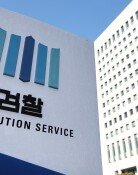Why the Ruling Party Lost
At a meeting of senior presidential secretaries Thursday, President Lee Myung-baks chief of staff Chung Chung-kil announced his resignation, saying, I humbly accept the will of the people. The presidential office and the ruling Grand National Party said the same thing when the ruling camp was defeated in by-elections on Oct. 28 last year. It also suffered a crushing defeat in by-elections on April 29 the same year. The ruling party says it will humbly accept the results but does it truly understand the cause of its defeat?
The party was upset in Wednesdays local elections due to arrogance, falling into chaos when nominating candidates. Opposition and independent candidates attracted many votes in Gangwon and South Gyeongsang provinces, two areas which have long supported the Grand National Party. On the other hand, the ruling party nominated candidates who had never supported the respective communities or prepare for discussion of pending issues. Due to conflict of interest by influential party members or incumbent lawmakers, certain incumbent heads of provincial and municipal governments with a strong support base failed to get nominated.
Factions loyal to President Lee and former party chief Park Geun-hye also feuded with each other, spelling doom for the partys chances of victory in the elections. Called the queen of elections, Park failed to play her due role as a responsible party member. Under the slogan of judging the Lee administration, opposition parties closely cooperated to field unified candidates and campaigned hard until the day before the elections. Ruling party candidates, however, acted as if they had already won. For example, Seoul Mayor Oh Se-hoon, who narrowly won reelection, said he would visit Incheon and Gyeonggi Province to help ruling party candidates in the two areas. He apparently believed his reelection was a sure thing. Another ruling party candidate, Lee Yoon-seong, angered voters by saying, It is fortunate that the Cheonan incident occurred near Incheon. In short, arrogance and carelessness invited election disaster.
Though many Koreans oppose the revised plan for the development of Sejong City and the four-river restoration project, the ruling camp has made little effort to provide an explanation. In the run-up to the elections, the ruling party claimed to be a digital party but made no efforts to win over voters in their 20s and 30s via the Internet.
If the ruling camp fails to understand public sentiment, its statement to pursue a complete overhaul will prove to be just empty talk. The presidential office, Cabinet and the ruling party must all conduct sweeping personnel reshuffles. The party and domestic politics have no hope unless old-fashioned political behavior preventing the emergence of new politicians disappears. Politicians who do everything for their own self interest regardless of external difficulty should be forced out. The Grand National Party waited ten years to regain power but faces a crisis after just 27 months. New party figures are sorely needed.



![“한동훈, 정치생명 걸고 무소속 출마해 평가받는 것 고려할만”[정치를 부탁해]](https://dimg.donga.com/c/138/175/90/1/wps/NEWS/IMAGE/2026/01/19/133186982.1.jpg)


![[한규섭 칼럼]왜 여당 지지율은 떨어지지 않는가](https://dimg.donga.com/c/138/175/90/1/wps/NEWS/IMAGE/2026/01/19/133189257.1.png)
